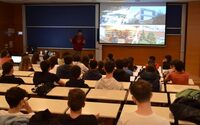During the last Pi Day, the CRM served up a mathematical challenge addressed at students from the UAB Faculty of Science and Biosciences.

Every March 14th (3/14 in the month/day format) mathematicians and math enthusiasts all over the world celebrate Pi Day, named after the constant (known by the Greek letter “π”) that represents the ratio of a circle’s circumference to its diameter and its fascinating history. The date, which also commemorates Albert Einstein’s birth date and was the day Stephan Hawking died, was designated in 2019 by UNESCO as the International Day of Mathematics.
The day was first celebrated in 1988 at San Francisco’s Exploratorium, started by physicist Larry Shaw. Traditions for Pi Day include eating pie (pun very much intended due to the fact that “pi” and “pie” are homophones in English /paɪ/) and reciting from memory the decimals of the number π (if you want a crack at the record, the current Guinness World Record is held by Rajveer Meena of India, who, in 2015, recited 70.000 digits of Pi). This year the CRM joined the celebration with a mathematical challenge aimed at the student community here at the UAB Science and Biosciences Faculty, launched on the same day via the CRM’s social networks, with prizes for the first three people to bring us the correct solutions.
You go on a beach holiday, but you get bored and your mathematician friend helps you with a problem. She/He gives you two empty buckets, one with a capacity of 3/4 L of water and the other with a capacity of π / 4 L of water. He then asks you how you would end up with a bucket containing 1/4 L of water with an error of less than 1%? How many water transfers do you need to get what she/he has asked for?
Three students (two form mathematics and one from biology) got the solution right and claimed their reward.

In praise of Pi
Pi is an irrational number, which means that it cannot be represented as a fraction, and its digits go on forever with no recurring patterns. This means that Pi is infinite, and its exact value can never be calculated (an approximation such as 3.14 or 22/7 is often used for everyday calculations). Currently, about 62.8 million digits of Pi have been discovered, with a group of researchers from the University of Applied Sciences of the Grisons in Switzerland holding the record.
The Pi number has been known for almost 4.000 years, since the times of ancient civilizations such as the Egyptians and Babylonians. The first calculation of π was done by Archimedes of Syracuse (287–212 BC), one of the greatest mathematicians of the ancient world. Over the ensuing centuries, Chinese, Indian, and Arab mathematicians extended the number of decimal places known through tedious calculations, rather than improvements on Archimedes’ method. It was not until 1706, however, that the Greek π letter was used to identify the number, with Philologist William Jones first using the symbol. Later on, it was Leonhard Euler who popularized the use of the symbol among the scientific community in 1737.
Famous mathematicians such as Fibonacci, Newton, Leibniz, and Gauss, have worked on the number, calculating its digits and using it in numerous areas of mathematics.

CRM Comm Team
Anna Drou | Paula Lomascolo | Pau Varela
CRMComm@crm.cat
Exploring Career Pathways for Mathematics Graduates: Insights from the ‘And after the Degree, What?’ Roundtable
The roundtable titled “And after the Degree, What?” held at the Universidad de La Rioja, during the Conference of Deans of Mathematics, explored various career options for mathematics graduates, such as academia and industry. David Romero, head of the Knowledge Transfer Unit (KTU) at CRM, discussed the unique aspects of industrial PhDs, emphasizing their value in producing highly qualified professionals.
Frank Trujillo, new MSCA postdoctoral researcher at the CRM
• The European Commission has announced the results of the 2023 Marie Sklodowska Curie Postdoctoral Fellowships (MSCA), selecting 1,249 postdoctoral researchers to join R&D institutions across Europe.• Among the funded proposals is that of...
El CRM celebra el seu primer certament de poesia en pilish
El Centre de Recerca Matemàtica (CRM) va celebrar el seu primer certamen de poesia pilish en ocasió del Dia Internacional de les Matemàtiques. Violant Martí va ser la guanyadora d'aquesta primera edició, escollida a través d'una votació popular en...
Participació del CRM a l’EspaiCiència
El passat 13 de març, Andrea Suárez, Fernando Gastón i Marcel Morillas, de la Unitat de Transferència del Coneixement del CRM (KTU), juntament amb Pau Varela i Mariona Fucho, de comunicació i divulgació, van participar a l’EspaiCiència dins del...
El matemàtic francès Michel Talagrand guardonat amb el premi Abel 2024
El Premi Abel 2024 ha estat atorgat a Michel Talagrand, matemàtic del Centre Nacional de la Recerca Científica (CNRS) a París, França. Talagrand ha desenvolupat la seva recerca en la teoria de probabilitats i l’anàlisi funcional, disciplines que investiguen el comportament dels processos aleatoris i les propietats dels espais i funcions. El Premi Abel, sovint comparat amb el Premi Nobel de matemàtiques, va ser establert pel govern noruec el 2002 per honorar el 200è aniversari del naixement de Niels Henrik Abel, un matemàtic noruec.
Estudiants de l’Institut La Vall del Tenes de Barcelona visiten el CRM
Més de cinquanta estudiants de l’Institut La Vall del Tenes de Barcelona van visitar el Centre de Recerca Matemàtica (CRM) el 21 de març, com a part de la seva participació en les proves Cangur. Durant la visita, els estudiants van poder conèixer de primera mà el món de la recerca científica a través de tres investigadors predoctorals del CRM, que van compartir els seus coneixements i experiències en camps tan diversos com la biologia matemàtica, neurociència i sistemes dinàmics.






